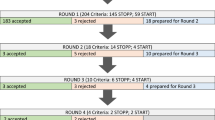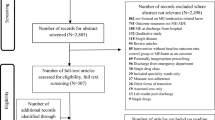Summary
This paper discusses GP perspectives on the principles underlying rational pharmacotherapy for older people. The rising use of prescription medicine forces the GP to balance the benefit of evidence group-based appropriate drug use against the problems arising when medication is given to older people and to consider different approaches when evaluating evidence of risk and benefit for the individual. Old people are facing a considerable risk of adverse drug reactions and recent initiatives, including the Continuous Medical Educational Efforts Programme, address issues of inappropriate prescribing practices.
The authors recommend and present tools enabling the GP to focus on ‘the core prescribing situation’. The logistics to optimise medication including compliance, the use of modern IT and better collaboration and communication between primary and secondary care are discussed. The authors state that a number of pharmacological regimens for older people are outperformed by non-pharmacological treatment alternatives involving competent individualised counselling and public provision of easy (transportation) possibilities for joining centres offering staff and equipment for physical and social activity (including basal aids for hearing and sight).
Zusammenfassung
Diese Arbeit befasst sich mit der hausärztlichen Perspektive der Prinzipien rationaler Pharmakotherapie für ältere Patienten. Steigender Verbrauch verordneter Medikamente fordert den Hausarzt, zwischen medikamentenbedingten Problemen älterer Patienten und dem Nutzen evidenzbasierten, angemessenen Medikamentengebrauchs abzuwägen. Verschiedene Ansätze zur Nutzen-Risiko-Ermittlung sollten bedacht werden. Für ältere Patienten besteht ein beachtliches Risiko durch unerwünschte Arzneimittelwirkungen. Neuere Initiativen, die Fortbildungskonzepte (CME) einschließen, behandeln die Themen inadäquater Verordnungspraxis.
Die Autoren sprechen Empfehlungen aus, die schwerpunktmäßig auf das Wesentliche der Verordnungssituation fokussieren. Hierbei wird auf die Rahmenbedingungen für optimierte Medikamentenverschreibung eingegangen. Dies sind u. a. die Berücksichtigung der Patienten-Compliance sowie die verbesserte Zusammenarbeit zwischen primärem und sekundärem Versorgungssektor.
Die Autoren betonen und unterstreichen, dass durchaus manche medikamentöse Therapie durch nicht-medikamentöse Alternativen zu ersetzen ist. Hierzu zählen professionelle und individuelle Beratung, öffentliche, für ältere Menschen einfach verfügbare Transportmittel zur Nutzung und Teilhabe an Möglichkeiten körperlicher und sozialer Aktivitäten. Dies schließt eine grundlegende Versorgung mit Seh- und Hörhilfen ein.
Similar content being viewed by others
References
Le Couteur DG, Hilmer SN, Glasgow N, Naganathan V, Cumming RG (2004) Prescribing in older people. Aust Fam Physician 33(11):871
Pirmohamed M, James S, Meakin S et al (2004) Adverse drug reactions as cause of admission to hospital: prospective analysis of 18820 patients. BMJ 329:15-19
Zhan C, Correa-de-Araujo R, Bierman et al (2005) Suboptimal prescribing in elderly outpatients: potentially harmful drug-drug and drug—disease combinations. J Am Geriatr Soc 53:262-267
Hanlon JT, Fillenbaum GG, Kuchibahtla M et al (2002) Impact of inappropriate drug use on mortality and functional status in representative community dwelling elders. Med Care 40:166-176
Bjerrum L, Andersen M, Petersen G, Kragstrup J (2004) Frequent drugdrug interactions in general practice. (In Danish, abstract in English). Ugeskr Lger 166:3401-3404
Tan H-H, McMurdo MET, Morris AD (2004) Evidence based medicine, guidelines and common sense. Age and Ageing 33:335-337
Lip GYH, Felmeden DC (2004) Antiplatelet agents and anticoagulants for hypertension. Cochrane Database of Systematic Reviews, p 3
Vass M, Avlund K, Lauridsen J, Hendriksen C (2005) Feasible model for prevention of functional decline in older people. Municipality-randomized controlled trial. J Am Geriatr Soc 53:563-568
Avlund K, Damsgaard MT, Schroll M (2001) Tiredness as determinant of subsequent use of social and health services. J Aging Health 13:267-286
Barat I (2001) Drugs and 75-year-olds. (In: Danish, summary in English). Ph.D. thesis. University of Aarhus
Author information
Authors and Affiliations
Corresponding author
Rights and permissions
About this article
Cite this article
Vass, M., Hendriksen, C. Medication for older people—. Z Gerontol Geriatr 38, 190–195 (2005). https://doi.org/10.1007/s00391-005-0310-1
Received:
Accepted:
Issue Date:
DOI: https://doi.org/10.1007/s00391-005-0310-1
Key words
- rational pharmacotherapy
- older people
- evaluating evidence of risk and benefit
- general practitioner’s point of view
- non-pharmacological treatment




